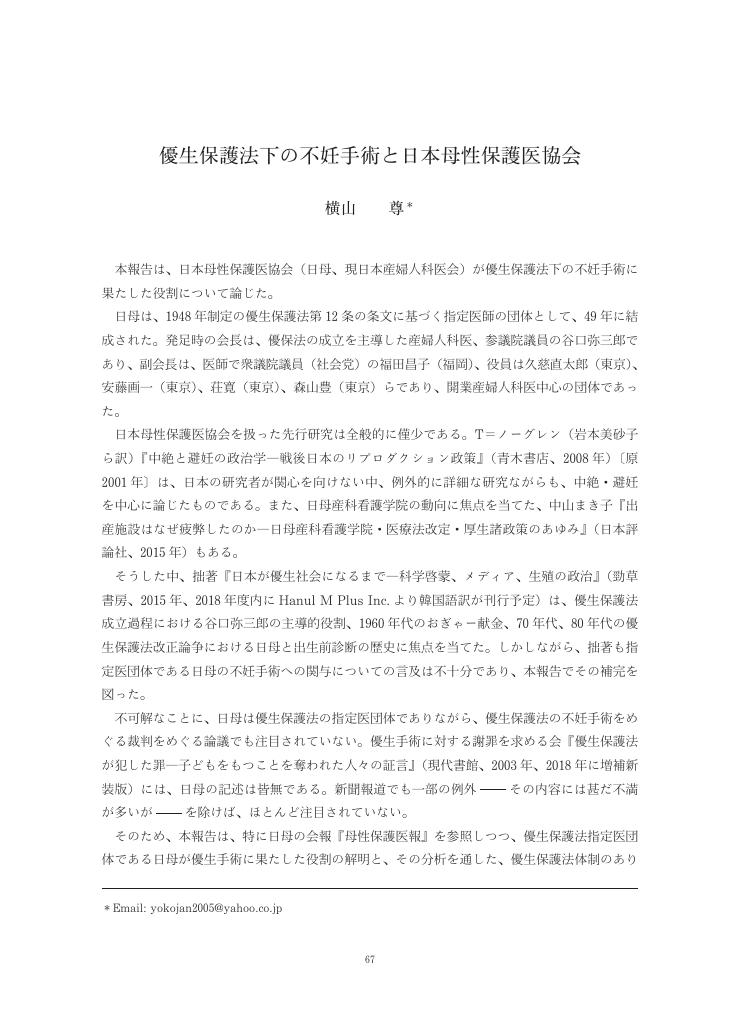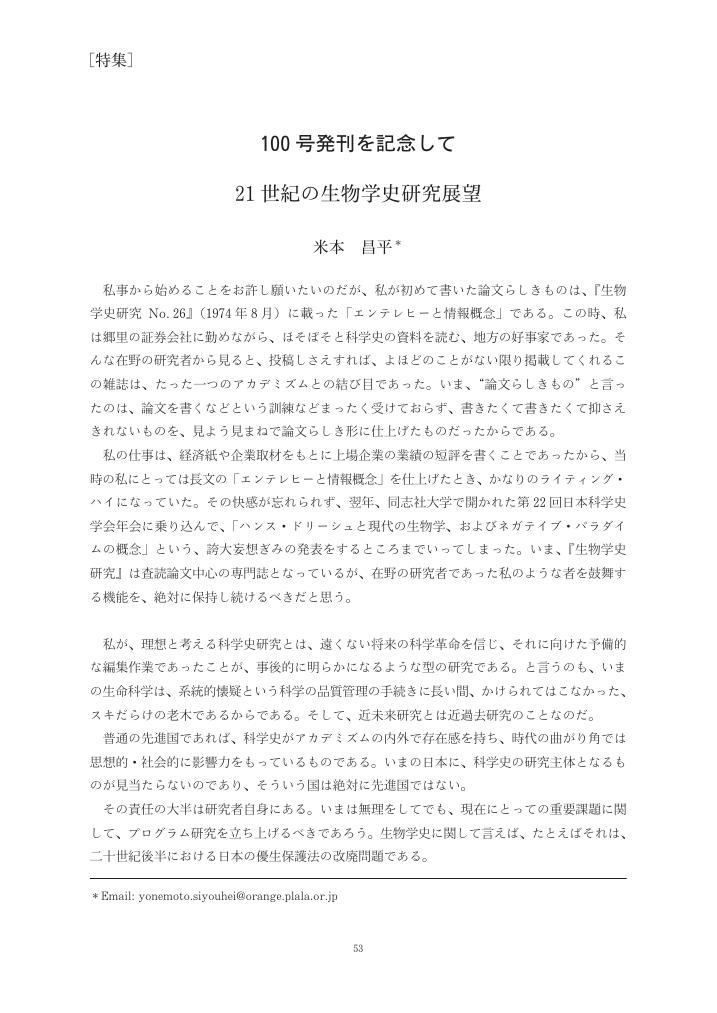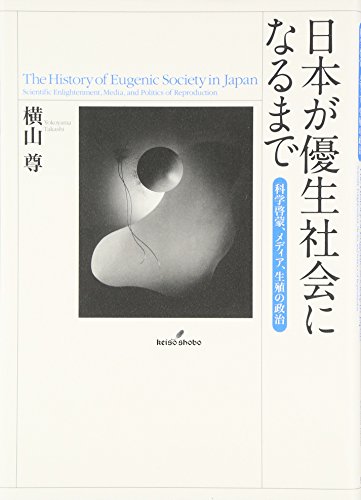13 0 0 0 OA 科学史入門 日本の優生学史研究のこれからを考えるために ―相模原事件と優生保護法報道への所見―
- 著者
- 横山 尊
- 出版者
- 日本科学史学会
- 雑誌
- 科学史研究 (ISSN:21887535)
- 巻号頁・発行日
- vol.60, no.297, pp.66-77, 2020 (Released:2021-10-06)
5 0 0 0 OA 出生前診断の歴史と現在 ――自発的優生学の系譜
- 著者
- 横山 尊
- 出版者
- 日本健康学会
- 雑誌
- 日本健康学会誌 (ISSN:24326712)
- 巻号頁・発行日
- vol.87, no.4, pp.139-160, 2021-07-31 (Released:2021-08-31)
- 参考文献数
- 70
This paper tries to provide precise understanding of the historical background and current status of prenatal diagnosis from the standpoint of historical studies of Japanese eugenics. SectionⅠargues that the prototype of the prenatal diagnosis and genetic counseling in the modern era were not sterilization laws such as the 1940 National Eugenic Law and the 1948 Eugenic Protection Law, but rather eugenic marriage and genetic counseling in the prewar era. SectionⅡdiscusses the status of the argument about abortion for fetal abnormality, amniotic diagnosis, and genetic counseling. Especially, this paper relativizes the stereotypes generated by the disability rights and women’s liberation movements, and tries to understand trends in prenatal diagnosis by utilizing oral histories from the Fukuoka area. Moreover, this paper stresses that the existence of voluntary eugenics has been wrongfully neglected in the historical studies of eugenics in Japan, and that the introduction of amniotic diagnosis in the 1970s should be included in that consideration. Taking cognizance of the above factors, this paper tries to situate prenatal diagnosis and genetic counseling within the history of eugenics, while at the same time looking ahead to a better understanding of the history and current state of prenatal diagnosis and eugenics.
本研究は、近代日本における禁酒運動と教育・メディアとの関係性を解明する。その解明に、日本禁酒同盟資料館の旧蔵史料を活用する。主な内容は次の通りである。①日本国民禁酒同盟(1920年結成)、姉妹団体の日本学生排酒聯盟(1922年結成)の活動に着目し、これらが学生や児童を禁酒運動に取り込みながら運動を展開したかを解明する。②同盟や聯盟が刊行したメディア、『禁酒新聞』、『のぞみの友』、『無酒国』などの編集方針と編集組織、執筆陣の分析を通し、メディアの禁酒教育への影響、各学校の運動家間のネットワークの解明を行う。③未成年者飲酒禁止法の運用、外地への拡張や改正をめぐる論議を、①、②を踏まえ解明する。
4 0 0 0 OA 優生保護法下の不妊手術と日本母性保護医協会
- 著者
- 横山 尊
- 出版者
- 日本科学史学会生物学史分科会
- 雑誌
- 生物学史研究 (ISSN:03869539)
- 巻号頁・発行日
- vol.98, pp.67-68, 2019-02-28 (Released:2020-09-08)
2 0 0 0 OA 優生学史における日本民族衛生学会の位置
- 著者
- 横山 尊
- 出版者
- 日本健康学会
- 雑誌
- 日本健康学会誌 (ISSN:24326712)
- 巻号頁・発行日
- vol.86, no.5, pp.197-208, 2020-09-30 (Released:2020-11-02)
- 参考文献数
- 32
This article examines the past involvement of the Japanese Society of Health and Human Ecology (formerly: Japanese Society of Race Hygiene) in eugenics laws, written at the request of the society.Section I describes the position of the Japanese Society of Race Hygiene, established in 1930, in the history of eugenics.Section II discusses some problem in the understanding of the historical facts in the Board of Directors report: “The Japanese Society of Race Hygiene and ‘the National Eugenic Law,’” and the resulting media coverage. This chapter also discusses the change of the characteristics of the society around 1938 and its involvement in eugenics. Moreover, this chapter shows the inappropriateness of the interpretation that the 1948 Eugenic Protection Law was a continuation of the 1940 National Eugenic Law, which itself was modeled on a 1933 Nazi eugenics law.Section III describes that the Japanese Society of Race Hygiene continued to have interest in eugenics even in the postwar era, and that in 1970s the society tried vehemently to eliminate any remnants of Nazi eugenic policies from the notion of “race hygiene”, at a time when there was a general assumption that eugenics as synonymous with the evil of Nazism. In conclusion, it is found that the society from that time to this day made passive attempts to erase and walk away from eugenics’ past.
- 著者
- 横山 尊
- 出版者
- 日本科学史学会 ; 2014-
- 雑誌
- 科学史研究. [第Ⅲ期] = Journal of history of science, Japan. [Series Ⅲ] (ISSN:21887535)
- 巻号頁・発行日
- no.297, pp.66-77, 2021-04
1 0 0 0 OA 特集 100号発刊を記念して
1 0 0 0 OA 拙著に対するコメントへの応答と優生学史研究に望むこと
- 著者
- 横山 尊
- 出版者
- 日本科学史学会生物学史分科会
- 雑誌
- 生物学史研究 (ISSN:03869539)
- 巻号頁・発行日
- vol.95, pp.76-83, 2017-06-30 (Released:2019-06-03)
- 著者
- 横山 尊
- 出版者
- 日本健康学会
- 雑誌
- 日本健康学会誌 = Japanese journal of health and human ecology (ISSN:24326712)
- 巻号頁・発行日
- vol.87, no.4, pp.139-160, 2021-07
1 0 0 0 出生前診断の歴史と現在:――自発的優生学の系譜
- 著者
- 横山 尊
- 出版者
- 日本健康学会
- 雑誌
- 日本健康学会誌 (ISSN:24326712)
- 巻号頁・発行日
- vol.87, no.4, pp.139-160, 2021
<p>This paper tries to provide precise understanding of the historical background and current status of prenatal diagnosis from the standpoint of historical studies of Japanese eugenics. SectionⅠargues that the prototype of the prenatal diagnosis and genetic counseling in the modern era were not sterilization laws such as the 1940 National Eugenic Law and the 1948 Eugenic Protection Law, but rather eugenic marriage and genetic counseling in the prewar era. SectionⅡdiscusses the status of the argument about abortion for fetal abnormality, amniotic diagnosis, and genetic counseling. Especially, this paper relativizes the stereotypes generated by the disability rights and women's liberation movements, and tries to understand trends in prenatal diagnosis by utilizing oral histories from the Fukuoka area. Moreover, this paper stresses that the existence of voluntary eugenics has been wrongfully neglected in the historical studies of eugenics in Japan, and that the introduction of amniotic diagnosis in the 1970s should be included in that consideration. Taking cognizance of the above factors, this paper tries to situate prenatal diagnosis and genetic counseling within the history of eugenics, while at the same time looking ahead to a better understanding of the history and current state of prenatal diagnosis and eugenics.</p>
1 0 0 0 優生学史における日本民族衛生学会の位置
- 著者
- 横山 尊
- 出版者
- 日本健康学会
- 雑誌
- 日本健康学会誌 (ISSN:24326712)
- 巻号頁・発行日
- vol.86, no.5, pp.197-208, 2020
<p>This article examines the past involvement of the Japanese Society of Health and Human Ecology (formerly: Japanese Society of Race Hygiene) in eugenics laws, written at the request of the society.</p><p>Section I describes the position of the Japanese Society of Race Hygiene, established in 1930, in the history of eugenics.</p><p>Section II discusses some problem in the understanding of the historical facts in the Board of Directors report: "The Japanese Society of Race Hygiene and 'the National Eugenic Law,'" and the resulting media coverage. This chapter also discusses the change of the characteristics of the society around 1938 and its involvement in eugenics. Moreover, this chapter shows the inappropriateness of the interpretation that the 1948 Eugenic Protection Law was a continuation of the 1940 National Eugenic Law, which itself was modeled on a 1933 Nazi eugenics law.</p><p>Section III describes that the Japanese Society of Race Hygiene continued to have interest in eugenics even in the postwar era, and that in 1970s the society tried vehemently to eliminate any remnants of Nazi eugenic policies from the notion of "race hygiene", at a time when there was a general assumption that eugenics as synonymous with the evil of Nazism. In conclusion, it is found that the society from that time to this day made passive attempts to erase and walk away from eugenics' past.</p>
1 0 0 0 優生保護法下の不妊手術と日本母性保護医協会
- 著者
- 横山 尊
- 出版者
- 日本科学史学会生物学史分科会
- 雑誌
- 生物学史研究 (ISSN:03869539)
- 巻号頁・発行日
- vol.98, pp.67-68, 2019
1 0 0 0 OA 後発帝国大学の設立理念と実態一九州帝国大学法文学部の場合一
戦前期の帝国大学(以下、帝大)のうち、法文学部が設置されたのは九州帝大と東北帝大だけであった。東京、京都の両帝大には、法学部、文学部、経済学の3学部が置かれ、一方、九州・東北帝大以降の北海道、大阪、名古屋の各帝大には、法文系学部は設置されなかった。このことは法文学部の存在そのものが、帝大史研究の中では一つの意味を持つことを示唆している。本研究は、このような法文学部について、九州帝大の事例を中心に考察したものである。
- 著者
- 横山 尊
- 出版者
- 大阪歴史学会
- 雑誌
- ヒストリア = Historia : journal of Osaka Historical Association (ISSN:04392787)
- 巻号頁・発行日
- no.277, pp.240-247, 2019-12
1 0 0 0 IR 山本作兵衛と日鉄二瀬禁酒聯盟
- 著者
- 横山 尊
- 出版者
- 九州大学附属図書館付設記録資料館産業経済資料部門
- 雑誌
- エネルギー史研究 (ISSN:02862050)
- 巻号頁・発行日
- no.33, pp.91-112, 2018-03
1 0 0 0 日本が優生社会になるまで : 科学啓蒙、メディア、生殖の政治
- 著者
- 横山 尊
- 出版者
- ゆまに書房
- 雑誌
- メディア史研究 (ISSN:13438107)
- 巻号頁・発行日
- vol.26, pp.81-106, 2009-10
1 0 0 0 『文化生活』の優生学--大正期の科学啓蒙と雑誌メディア
- 著者
- 横山 尊
- 出版者
- 吉川弘文館
- 雑誌
- 日本歴史 (ISSN:03869164)
- 巻号頁・発行日
- no.730, pp.75-95, 2009-03




